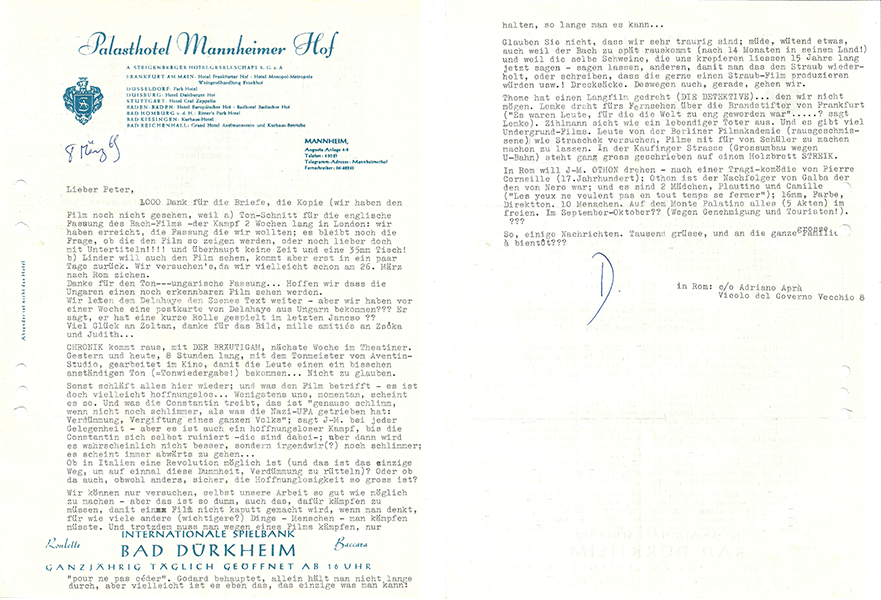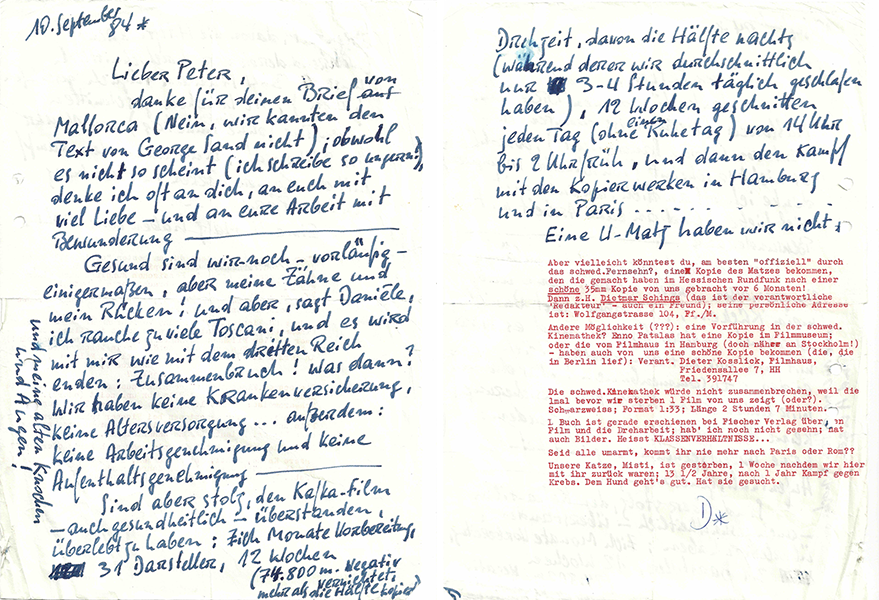Letters to Peter Nestler

Danièle Huillet, letter to Peter Nestler
March 8, 1969
(Letter from Palasthotel Mannheimer Hof)
Dear Peter,
A 1000 thanks for the letters, the print (we haven’t seen the film yet, because a) sound editing for the English version of the Bach film – a 2-week long struggle in London: we have arrived at the version we wanted; now it’s only a question of whether they will show the film as it is, or still prefer showing it with subtitles!!!! land no time at all and no 35mm flatbed editor! b) Linder also wants to see the film, but won’t be back for a few days. We’ll try, as we may be moving to Rome already on March 26.
Thanks for the audio – Hungarian version... Let’s hope that the Hungarians get to see a fairly recognisable film. We’ll pass the Szemes text on to Delahaye – but a week ago we received a postcard from Delahaye from Hungary??? He tells us that he played a small role in the latest Jancsó film??? Good luck to Zoltán, thanks for the photo, mille amitiés to Zsóka and Judith …
Chronik will be released together with Der Bräutigam, next week in Theatiner. Yesterday and today, 8 hours with the sound engineer from Aventin Studio, we’ve been working in the cinema so that people can have a bit of proper sound (= sound reproduction)... Unbelievable.
Apart from that, everything has calmed down here again; and as for the film – maybe it’s hopeless after all... At least that’s what it looks like to us at the moment. And what the people from Constantin are doing is “just as bad, if not worse, than what the Nazi UFA was doing: stupefying, poisoning a whole people”; says J.-M. at every opportunity – but this is also a hopeless struggle until Constantin ruins itself – they’re well on their way –; but then it probably won’t get better, but somehow (?) even worse; things seem to be going downhill …
Whether a revolution is possible in Italy (and that is the only way to shake this stupidity and dumbing down all at once)? Or whether the hopelessness, although different, is also so great there?
All we can do is try to do our job as well as we can – but that too is so stupid, to have to fight for a film not to be ruined, considering how many other (more important?) things – people – we ought to be fighting for. And yet you must fight for a film “pour ne pas céder”. Godard claims that you don’t last long on your own, but maybe that’s all you can do: hold out as long as you can…
Don’t you think we are very sad; tired, a little angry that Bach is coming out too late (after 14 months in his own country!), and because the same bastards who let us languish, let us off the hook for 15 years, now say – say to others, so that they may repeat it to Straub, or write – that they would like to produce a Straub film, etc.! Bastards! That’s why we’re leaving.
Thome has made a feature film (Die Detektive)... which we don’t like. Lemke is shooting a film for TV about the Frankfurt arsonists (“They were people for whom the world had become too narrow” ...? says Lemke). Zihlmann looks like the living dead. And there are many underground films. People from the Berlin Film Academy (who were kicked out), like Straschek, try to make films with, for and by students, to let them make the films. In Kaufinger Straße (major renovation due to the subway), a wooden board reads in large letters: STREIK.
In Rome, J.-M. will film Othon – after a tragicomedy by Pierre Corneille (17th century); Othon is the successor to Galba, who was the successor to Nero; and it’s about 2 girls, Plautine and Camille (“Le yeux ne veulent pas en tout temps se fermer”); 16mm, colour, direct sound. 10 people. At Monte Palatino, all (5 acts) under the open sky. In September-October?? (Due to permission and tourists!).???
So, quite a bit of news. A thousand greetings, and to the whole big family: à bientôt???

Danièle Huillet and Jean-Marie Straub, letter to Peter Nestler
September 10, 1984
(JMS – handwritten)
Dear Peter,
Thank you for your letter from Mallorca (No, we didn’t know the text by George Sand); although it may not appear so (I don’t like writing!), I often think of you, of you all, with many loving thoughts – and of your work with admiration_______________________
We are still healthy – for now – to a certain extent, but my teeth and my back! And my tired old bones and eyes! But, says Danièle, I smoke too many Toscani, and I’ll end up like the Third Reich: collapse! What then? We have no health insurance, no pension plan… besides: no work permit and no residence permit______________________
But we are proud to have survived the Kafka film – also in terms of our health: many months of preparation, 31 actors, 12 weeks of shooting (74,800 m. negative, more than half of it destroyed in the film lab), half of which was at night (where we only slept 3-4 hours a day on average), editing every day for 12 weeks (without a day of rest), from fi14:00 to 2 in the morning, and then the battle with the film labs in Hamburg and Paris…………………
We don’t have a U-matic.
(Danièle – typewritten)
But maybe you could, preferably “officially” through Swedish TV, get hold of a copy of the broadcast that Hessiche ish Rundfunk made, from a fine 35mm print that we gave them 6 months ago! If so, send to Dietmar Schings (that’s the “editor” in charge – also a friend); his personal address is: Wolfgangin Wolfgangstrasse 104, Fr./M.
Another option (????): A screening at the Swedish Cinematheque? Enno Patalas has a print at the Film Museum; or the people from the Filmhaus in Hamburg (closer to Stockholm after all!) – also got a nice print from us (the one shown in Berlin):
Responsible. Dieter Kosslick, Filmhaus,
Friedensallee 7, HHFriedensallee HH
Tel. 391747Tel. 391747
The Swedish Cinematheque wouldn’t go out of business because they show 1 of our films just 1 time before we die (or cause would they?). Black and white; format 1:33; Length: 2 hours 7 minutes.
A book about the film and its production has just been published by Fischer Verlag; haven’t seen it yet; also contains images. It’s called Klassenverhältnisse …
Hugs and kisses to all of you, will you never come to Paris or Rome again?
Our cat, Misti, passed away, 1 week after we came back to her; 13 ½ years, after a 1-year battle with cancer. The dog is fine. It has been looking for her.
D*
Images (1) & (2) Danièle Huillet, letter to Peter Nestler March 8, 1969
Images (3) & (4) Danièle Huillet and Jean-Marie Straub, letter to Peter Nestler September 10, 1984
With thanks to Peter Nestler, Oscar Pedersen, Viktor Retoft and Balthazar.
This article was originally published in Balthazar no. 9, 2023, dedicated to the work of Danièle Huillet and Jean-Marie Straub.

